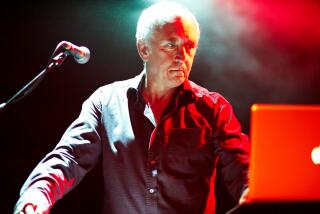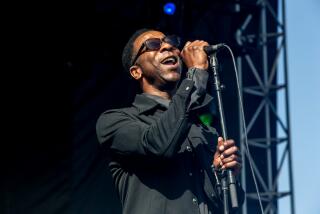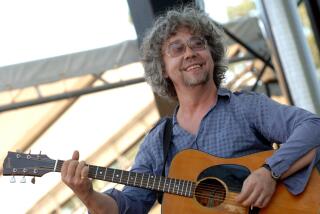With Chris Cornell’s death, a generation lost its Robert Plant
For those too young to have Led Zeppelin, we got Soundgarden.
The shared legacy was always up front with the two bands — the snaking odd-time riffs, Chris Cornell’s guttural howl and wild-man shriek, the constant bare torso and the feeling that technically-genius rock and roll still had a feral side.
For the record:
8:09 p.m. April 19, 2024An earlier version of this story incorrectly identified one of Chris Cornell’s projects. It was Temple of the Dog that reunited last year and not Mother Love Bone.
You can see it plainly in this 2015 interview between Cornell and Jimmy Page at the Ace Hotel — Cornell’s adoration, the humility, the sense of responsibility toward keeping a flame alive.
Cornell’s death at 52 is a cap on that flame and an end to perhaps the best living connection to an idea of rock and roll as a force of nature so big it can change cultures, remake cities and turn ordinary people into something like gods.
Fellow Seattleite Kurt Cobain was eventually the bigger star, the vanguard of a new cultural era that no one saw coming. But for a long time, it was all but assumed that Chris Cornell was the new Robert Plant, the sinewy, long-haired singer with a voice that could cut through the ferocious, metal-indebted riffing.
There were the Middle-Eastern melodic twinges, spiritual yearnings (for Zep, it came from Tolkien, for Cornell it came from the fog of depression) and above all a sense of taking heavy rock’s potential seriously again. Soundgarden was maybe the most natural arena act of the grunge era, invoking the ghosts of their ’70s predecessors with the prospect that you could be the biggest rock band in the world by being the best.
Chris Cornell tried a lot of things in his life — from the proto-grunge project Temple of the Dog that helped kickstart a movement (and which he reunited to acclaim last year), to Audioslave, his politically minded union with Rage Against the Machine’s instrumentalists (which also reunited to protest Donald Trump’s election) and a congenial run of acoustic solo material just before Soundgarden’s 2010 reformation.
He even made an electronic record with Timbaland that was, arguably, a misguided but noble experiment (and, for what it’s worth, the only time in my career I later truly regretted being so mean in an album review).
But Soundgarden was his home, and it’s fair to say that, given the shifts in pop music, there will never be another singer like him in a band like that. When I saw them in 2011 they were as good as they’d ever been — older, yes, but well settled into this sound and performing like they were out to prove its worth again. And they did.
There will be great rock acts again, there will be spectacular voices pained by sex and drugs and depression, and there will be people who fit into his lineage, just like Cornell fit into Plant’s.
But right now we are running out of true rock gods, and whatever comes of that idea, Cornell will forever be a fixture in that family tree.
For breaking music news, follow @augustbrown on Twitter.
ALSO
Chris Cornell, who helped reignite hard rock in the 1990s with Soundgarden, dies at 52
Music world mourns the death of Chris Cornell
Live: Soundgarden at the Forum
More to Read
The biggest entertainment stories
Get our big stories about Hollywood, film, television, music, arts, culture and more right in your inbox as soon as they publish.
You may occasionally receive promotional content from the Los Angeles Times.







